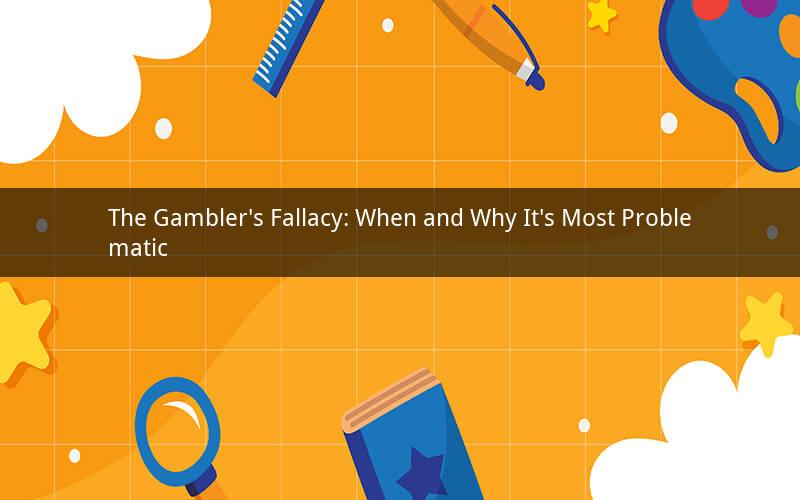
The gambler's fallacy, also known as the Monte Carlo fallacy, is a cognitive bias that occurs when individuals believe that a random event is more or less likely to happen based on previous outcomes. This fallacy is most problematic when it leads to poor decision-making and can have significant consequences in various contexts. In this article, we will explore when and why the gambler's fallacy is most problematic.
1. In the context of gambling
The gambler's fallacy is most problematic in the context of gambling, where it can lead to significant financial losses. For instance, consider a coin toss. If a coin lands on heads 10 times in a row, many individuals might believe that the next toss is more likely to land on tails. However, each coin toss is an independent event, and the probability of landing on heads or tails remains 50% regardless of previous outcomes. The gambler's fallacy can cause individuals to continue betting on losing streaks, leading to further losses.
2. In financial markets
The gambler's fallacy can also be problematic in financial markets, where investors may make poor decisions based on past trends. For example, if a stock has been rising for the past few days, an investor might believe that it is more likely to continue rising. However, stock prices are influenced by a multitude of factors, and past trends do not guarantee future performance. The gambler's fallacy can lead to overconfidence and can result in investing in stocks that may not be a good long-term investment.
3. In sports betting
Sports betting is another area where the gambler's fallacy can be problematic. If a team has won consecutive games, some bettors might believe that the team is due for a loss in the next game. However, the outcome of each game is independent of previous games, and the team's performance in the next game is not guaranteed to be affected by its previous victories. The gambler's fallacy can lead to poor betting decisions and can result in significant financial losses.
4. In decision-making processes
The gambler's fallacy can also be problematic in decision-making processes, where individuals may make decisions based on past outcomes rather than considering all available information. For example, if a company has had a successful product launch in the past, it may be more likely to believe that a new product will also be successful without conducting thorough market research. This can lead to poor business decisions and can result in financial losses for the company.
5. In psychological research
The gambler's fallacy can also be problematic in psychological research, where researchers may misinterpret data based on past outcomes. For instance, if a participant has answered a question correctly in a previous trial, a researcher might believe that the participant is more likely to answer the same question correctly in the next trial. However, the outcome of each trial is independent, and the participant's performance in the next trial is not guaranteed to be affected by their previous performance. The gambler's fallacy can lead to misinterpretation of data and can result in flawed research findings.
Questions and Answers:
1. Q: How can the gambler's fallacy be avoided in gambling?
A: To avoid the gambler's fallacy in gambling, it is essential to understand that each event is independent of previous outcomes. It is crucial to set a budget and stick to it, avoid chasing losses, and make informed decisions based on probabilities rather than past trends.
2. Q: Can the gambler's fallacy be avoided in financial markets?
A: Yes, the gambler's fallacy can be avoided in financial markets by conducting thorough research, considering all available information, and avoiding overconfidence. It is crucial to diversify investments and to remember that past performance does not guarantee future results.
3. Q: How can the gambler's fallacy be addressed in sports betting?
A: To address the gambler's fallacy in sports betting, it is important to focus on the current performance of teams and players rather than their past results. It is also essential to consider other factors such as injuries, weather conditions, and home-field advantage when making betting decisions.
4. Q: Can the gambler's fallacy be mitigated in decision-making processes?
A: Yes, the gambler's fallacy can be mitigated in decision-making processes by gathering all available information, considering the context of the decision, and avoiding making decisions based solely on past outcomes. It is crucial to remain objective and to consult with others when necessary.
5. Q: How can researchers avoid the gambler's fallacy in psychological research?
A: Researchers can avoid the gambler's fallacy in psychological research by ensuring that each trial is independent of previous trials, using appropriate statistical methods, and being aware of their own biases. It is crucial to focus on the data and to interpret it objectively, without letting past outcomes influence their conclusions.